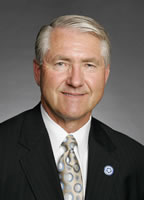Legislation Filed to Increase Penalties for Drunk Driving
 Sen. Harry Coates
Sen. Harry Coates
Each year, more than 17,000 Americans are killed by drunk drivers including approximately 275 Oklahomans and around 1.5 million drunk drivers are arrested according the Oklahoma Highway Safety Office. Having lost a loved-one in 2008 at the hands of a drunk driver, Sen. Harry Coates has filed legislation to strengthen the penalties against these individuals in hopes that other families won’t have to suffer like his and so many other families have.
SB 1014, also known as the Brandon Burgett Act, is named in memory of Coates’ sister-in-law’s 20-year-old step-nephew. Burgett was killed and his 17-year-old girlfriend put in the hospital after a drunk driver hit them head on as they were coming back from a Christian concert in Oklahoma City on July 5. The drunk driver, 26-year-old Brent Johnson, was killed also. The young couple was driving to Sen. Coates’ brother’s house, where Burgett had lived for the past three years while attending Seminole State College. They were a half mile from their turnoff on I-40 when Johnson hit them head on while traveling west bound in the east bound lane.
“Law enforcement officials told us that thirty seconds more and Brandon and his girlfriend would have been safely off the highway. One’s life can change in an instant, and on that Sunday two lives were senselessly lost and, sadly, they’re just two of the thousands of Americans that die each year in drunk driving accidents,” said Coates, R-Seminole. “We’re all human and we make mistakes, but we must do something in our society so that people stop taking the risk of getting behind the wheel drunk because there aren’t always second chances when it comes to drinking and driving.”
In Oklahoma, those found above the legal blood alcohol limit can lose their license for up to six months and face a fine of up to $5,000, which doesn’t include attorney fees or auto insurance rate increases, and even possible cancellation. They can also get up to a year or more of mandatory prison time, or possible community service or in-patient rehabilitation treatment. But Coates believes these penalties are not sufficient enough to address the problem seeing how many are repeat offenders.
According to a 2008 National Highway Traffic Safety Administration (NHTSA) report released in November, there are an estimated two million drunk drivers with three or more convictions in the U.S., including 400,000 drunk drivers with five or more convictions.
Coates pointed out that Johnson had a previous arrest on his record for drunk driving without a license or insurance, but was back behind the wheel that night once again after drinking and again without a license or insurance.
“Our laws have little effect on the amount of drunk driving in our state. We have to strengthen these laws so that people truly fear the consequences of getting caught driving drunk,” said Coates. “If someone shoots and kills another person, the police take their gun. In cases of drunk driving, a person’s car is their weapon, so why not take it away? I think vehicle forfeiture may be the only way to get drunks off of our roads and keep our families safe. ”
SB 1014 would require an individual to forfeit all vehicles in which that person has an ownership interest following his or her first DUI felony offense conviction. Under the bill, the defendant would be required to pay all the costs associated with the forfeiture including the wrecker and storage. After paying off all the expenses, any leftover funds from the sale of a forfeited vehicle would be deposited in the Drug Abuse Education and Treatment Revolving Funds for use in the treatment and drug testing of indigent substance abusing offenders participating in the Oklahoma Drug Court Act or for substance abuse prevention.
 Oklahoma Senate
Oklahoma Senate

